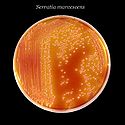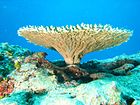White pox disease

White pox disease (also "acroporid serratiosis" and "patchy necrosis"), first noted in 1996 on
At the locations where white pox disease has been observed, it is estimated to have reduced the living tissue in elkhorn corals by 50–80%.[3] In the Florida Keys National Marine Sanctuary (FKNMS), the losses of living coral are estimated to average around 88%.[1] Elkhorn coral was formerly the dominant shallow water reef-building coral throughout the Caribbean but now is listed as a threatened species, due in part to the disease.[4] Elkhorn coral is the first species of coral to be listed as threatened in the United States.[5]
Serratia marcescens

The pathogen responsible is believed to be
See also
- Gorgoniansoft corals commonly known as sea fans.
- Black band disease, caused by a microbial consortium dominated by the cyanobacteria Phormidium corallyticum.
- fungal.
- Brown band disease, or red band disease, probably caused by protozoa (possibly Helicostoma nonatum) and cyanobacteria.
- Rapid wasting syndrome, possibly caused by a fungus growing on areas damaged by the feeding of the Stoplight parrotfish.
- White band disease, the cause of this disease remains unknown.
- White plague, caused by the bacterium Aurantimonas coralicida.
- protozoan Halofolliculina corallasia.
- Yellow-band disease, possibly caused by an unidentified species of Vibrio
Notes
- ^ a b c d Sutherland, Kathryn Patterson; Kim B. Ritchie. "White Pox Disease of the Caribbean Elkhorn Coral, Acropora palmata" (PDF). Retrieved 2009-08-22.
- ISBN 3-540-20772-4.
- ^ "Reef Relief - Coral Stress and Disease". www.reefrelief.org. Archived from the original on April 8, 2009. Retrieved 2009-08-22.
- ^ "Elkhorn Coral (Acropora palmata)—Office of Protected Resources—NOAA Fisheries". www.nmfs.noaa.gov. Retrieved 2009-08-22.
- ^ Amendola, Kim (May 5, 2006). "Elkhorn and Staghorn corals listed in threatened status" (PDF). Press release. NOAA. Retrieved 2009-08-22.
- PMID 12077296.
- ^ a b UGA News Bureau. "Common Bacteria Kills Elkhorn Coral off Florida Keys, says UGA Research Team". Press release. www.uga.edu. Retrieved 2009-08-22.

